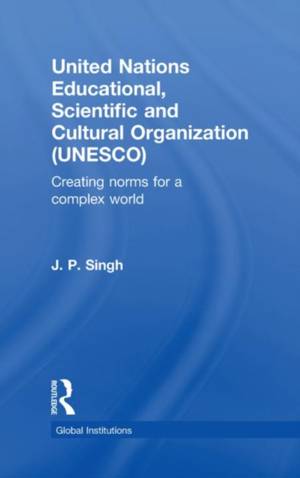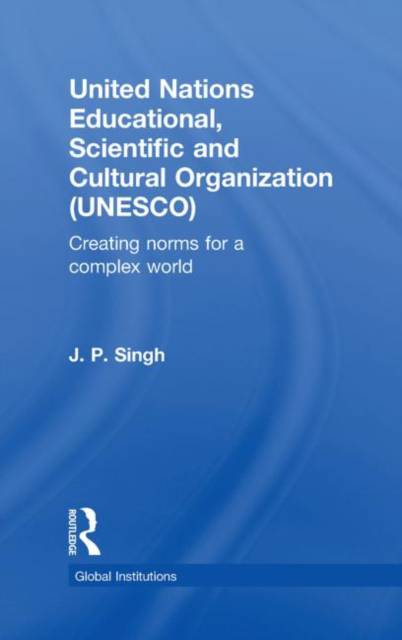
Bedankt voor het vertrouwen het afgelopen jaar! Om jou te bedanken bieden we GRATIS verzending (in België) aan op alles gedurende de hele maand januari.
- Afhalen na 1 uur in een winkel met voorraad
- In januari gratis thuislevering in België
- Ruim aanbod met 7 miljoen producten
Bedankt voor het vertrouwen het afgelopen jaar! Om jou te bedanken bieden we GRATIS verzending (in België) aan op alles gedurende de hele maand januari.
- Afhalen na 1 uur in een winkel met voorraad
- In januari gratis thuislevering in België
- Ruim aanbod met 7 miljoen producten
Zoeken
United Nations Educational, Scientific, and Cultural Organization (Unesco)
Creating Norms for a Complex World
J P Singh
€ 290,45
+ 580 punten
Uitvoering
Omschrijving
This book traces the history of UNESCO from its foundational idealism to its current stature as the preeminent international organization for science, education, and culture, building a well rounded understanding of this important organization.
The book:
- provides an overview of the organization and its institutional architecture in the context of its humanistic idealism
- details the subsequent challenges UNESCO faced through cold war and power politics, global dependence and interdependence, and the rise of identity and culture in global politics
- analyses the functioning of UNESCO administration, finance, and its various constituencies including the secretariat, member-states, and civil society
- explores the major controversies and issues underlying the initiatives in education, sciences, culture and communication
- examines the current agenda and future challenges through three major issues in UNESCO: Education or All, digital divide issues, and norms on cultural diversity
- assesses the role of UNESCO in making norms in complex world of multiple actors and intersecting issue-areas.
Reflecting on UNESCO's vision, its everyday practices, and future challenges; this work is an essential resource for students and scholars of international relations and international organizations.
Specificaties
Betrokkenen
- Auteur(s):
- Uitgeverij:
Inhoud
- Aantal bladzijden:
- 192
- Taal:
- Engels
- Reeks:
Eigenschappen
- Productcode (EAN):
- 9780415491136
- Verschijningsdatum:
- 1/02/2010
- Uitvoering:
- Hardcover
- Formaat:
- Genaaid
- Afmetingen:
- 137 mm x 216 mm
- Gewicht:
- 340 g

Alleen bij Standaard Boekhandel
+ 580 punten op je klantenkaart van Standaard Boekhandel
Beoordelingen
We publiceren alleen reviews die voldoen aan de voorwaarden voor reviews. Bekijk onze voorwaarden voor reviews.









